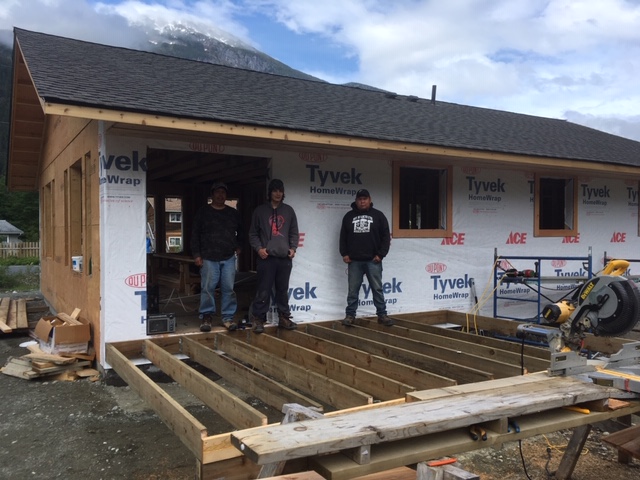Nuxalk Nation in British Columbia builds homes and strength

Workers in front of a home reno underway in the community.
Nuxalk Nation in Bella Coola, British Columbia has begun building homes designed by and for their own people, and along with them, a stronger community.
The new approach to housing began with Richard Hall, a Nuxalk Red Seal carpenter who has worked in construction for 33 years as a builder and building inspector on and off reserve. "In my experience as an inspector, I saw the chaos and horrific damage to homes on the West Coast," he said, explaining that a large part of the problem was that existing houses were not suitable for the climate, which is very wet with high winds and erratic temperatures.
Hall created a design for homes and other buildings that could withstand those conditions with 1-metre roof overhang on all sides to act as a rain screen and a three-quarter inch air space between the siding and the building as further protection. His design also uses mould-resistant drywall and triple-pane windows. It is much more energy efficient, reducing the cost of electricity and heat for homes to $1.50 per day.
Aside from the climate outside, Hall said, housing has also been ill-suited to the culture of the people living inside. "First Nations people are dependent on the ocean and wild game, so they use their kitchens for a lot of boiling water, but the houses were never designed for that." He explained that the new housing has much better ventilation that doesn't depend on expensive fans. And, he added, they teach new homeowners maintenance and homecare tips such as opening windows to create natural cross-ventilation.
Two new triplexes have been built, and there are plans for a big house that the community could use for ceremonies. Through Budget 2016, Indigenous Services Canada provided $1.4 million for new housing and another $250,000 for renovations of 10 existing houses.
Through its British Columbia regional office, ISC also supported Nuxalk Nation with developing and implementing their own housing strategies to meet the needs of their community. The Nuxalk Nation leveraged this funding along with their own equity and other financing partners for its vision for cultural, safe and affordable housing with long term socio-economic benefits to the community. They were able to reduce costs for the project by using their own resources, such as timber and a mill.
They are also developing a skilled local work force. Hall has trained 32 apprentices, both men and women, through the community's carpentry program operated with Camosun College in Victoria. Of them, 16 are in their fourth year and will soon write exams to become internationally certified Red Seal carpenters, who are also able to help train others.
Nuxalk Chief Wally Webber said bringing the education program to the community has dramatically increased the student success rate from about 1% to 80%, noting that many students are single parents who couldn't afford to go live in a city to study.
Homeowners are proud of their new homes, and training for these careers has been empowering for the students, Hall said. "Now they are more self-sufficient, more independent, proud of the work that has been done by us."